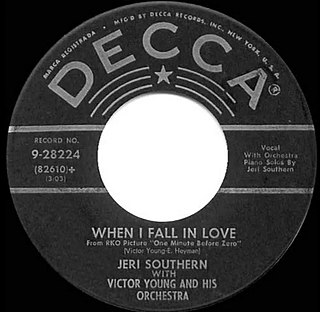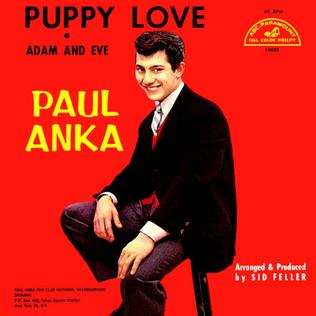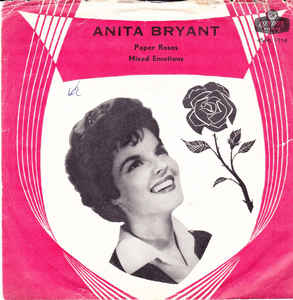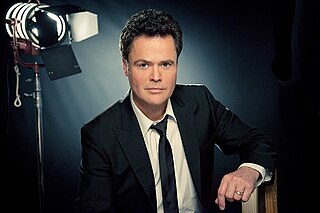
"Ain't Nothing Like the Real Thing" is a 1968 single released by American R&B/soul duo Marvin Gaye and Tammi Terrell, on the Tamla label in 1968. The B-side of the single is "Little Ole Boy, Little Ole Girl" from the duo's United LP. The first release off the duo's second album: You're All I Need, the song—written and produced by regular Gaye/Terrell collaborators Ashford & Simpson—became a hit within weeks of release eventually peaking at number eight on the US Billboard Hot 100 and number one on the Hot Soul Singles chart, the first of the duo's two number-one R&B hits. In the UK "Ain't Nothing Like the Real Thing" reached number 34.

"When I Fall in Love" is a popular song, written by Victor Young (music) and Edward Heyman (lyrics). It was introduced in Howard Hughes' last film One Minute to Zero as the instrumental titled "Theme from One Minute to Zero". Jeri Southern sang on the first vocal recording released in April 1952 with the song's composer, Victor Young, handling the arranging and conducting duties. The song has become a standard, with many artists recording it; the first hit version was sung by Doris Day released in July 1952.
"Too Young" is a popular song, with music written by Sidney Lippman and lyrics by Sylvia Dee. A recording of the song was released by Nat King Cole in 1951, which reached No. 1 in the United States and became the best-selling song of the year. The song was an early attempt by music labels to appeal to the younger demographics and its success later led to a boom of music that caters to the young. Another successful version was released by Donny Osmond in 1972.

"Are You Lonesome Tonight?" is a song written by Roy Turk and Lou Handman in 1926. It was recorded several times in 1927—first by Charles Hart, with successful versions by Vaughn De Leath, Henry Burr, and the duet of Jerry Macy and John Ryan. In 1950, the Blue Barron Orchestra version reached the top twenty on the Billboard's Pop Singles chart.
"Deep Purple" is a song and the biggest hit written by pianist Peter DeRose, who broadcast between 1923 and 1939 with May Singhi as "The Sweethearts of the Air" on the NBC radio network. The British rock band Deep Purple named themselves after the song.

"Who's Sorry Now?" is a popular song with music written by Ted Snyder and lyrics by Bert Kalmar and Harry Ruby. It was published in 1923 as a waltz. Isham Jones had a hit recording in 1923 with the song arranged as a foxtrot. Later sheet music arrangements, such as the 1946 publication that was a tie-in to the film A Night in Casablanca, were published in 2
2 time. Other popular versions in 1923 were by Marion Harris, Original Memphis Five, Lewis James, and Irving Kaufman.
"Why" is a hit song recorded by Frankie Avalon in 1959. It reached No. 1 on the U.S. Billboard Hot 100 chart published on the week of December 28, 1959. It was Avalon's second and final No. 1 hit.
"Love Letters in the Sand" is a popular song first published in 1931.

"Puppy Love" is a popular song written by Paul Anka in 1960 for Annette Funicello, a Mouseketeer, whom he had a crush on. Anka's version reached No. 2 on the Billboard Hot 100 behind Percy Faith's "Theme from A Summer Place", No. 4 on the Canadian CHUM Charts, and No. 33 on the UK Singles Chart.

"The Twelfth of Never" is a popular song written in 1956 and first recorded by Johnny Mathis the following year. The title is a popular expression, which is used as the date of a future occurrence that will never come to pass. In the case of the song, "the 12th of Never" is given as the date on which the singer will stop loving his beloved, thus indicating that he will always love him or her.

"Go Away Little Girl" is a popular song written by Gerry Goffin and Carole King. It was first recorded by Bobby Vee for Liberty Records on March 28, 1962. The lyrics consist of a young man asking a young attractive woman to stay away from him, so that he will not be tempted to betray his steady girlfriend by kissing her. The song is notable for making the American Top 20 three times: for Steve Lawrence in 1963, for The Happenings in 1966, and for Donny Osmond in 1971. It is also the first song, and one of only nine, to reach US number 1 by two different artists. Also notable in each of the solo versions is the similar double-tracked treatment of the singer's voice.

"Paper Roses" is a popular song written and composed by Fred Spielman and Janice Torre. It first was a top five hit in 1960 for Anita Bryant. Marie Osmond recorded it in 1973 and took her version to number one on the US country chart.

"I'm Leaving It Up to You" is a song written by and originally performed by Don Harris and Dewey Terry in 1957. It was later popularized in 1963 by the American duo Dale and Grace, who took it to #1 on the Billboard Hot 100 chart. In 1974, Donny and Marie Osmond reached the top five on the US Hot 100 chart and peaked at #1 on the Billboard Hot Adult Contemporary chart with their cover.

The discography of American country pop singer Marie Osmond contains 12 studio albums, three compilation albums, one soundtrack album, 33 singles and 2 album appearances. She first gained exposure on television with her siblings' group, The Osmonds. She then signed her own recording contract with MGM Records. Osmond specifically chose to be marketed towards the country field. In 1973, she released her debut single, "Paper Roses." The song reached number one on the Billboard Hot Country Songs chart and crossed into the top five of the Billboard Hot 100. Her debut studio album of the same name also topped Billboard's country albums chart and spent 20 weeks on the survey. It was also her highest charting album on the Billboard 200 all-genre chart, climbing to number 59. She followed this with 1974's "In My Little Corner of the World" and 1975's "Who's Sorry Now." Both singles reached the top 40 of the Billboard country songs chart. In addition, she released two more studio albums with MGM during this period. She then began a duet career with her brother during the latter half of the 1970s. However, in 1977 she recorded a solo album of pop music entitled This Is the Way That I Feel.

"Hey Girl" is a song written and composed by Gerry Goffin and Carole King. It first became a popular Top ten hit on the Billboard Hot 100 in August 1963 when recorded by Freddie Scott. Donny Osmond took the song back to the Billboard top ten chart with his cover in 1971. Billy Joel recorded a version of the song for his 1997 album Greatest Hits Volume III.

The discography of American pop singer Donny Osmond contains 18 studio albums, nine compilation albums, one live album, four video albums, three extended plays, four music videos, 25 singles and eight additional appearances. After several years collaborating with his siblings' band, The Osmonds, he embarked on a solo career in 1971. His debut single, "Sweet and Innocent," reached number seven on the Billboard Hot 100 and made him a teen pop star. Its follow-up entitled "Go Away Little Girl" topped the same chart in 1971. Also in 1971 his debut studio album was released called The Donny Osmond Album. It peaked at number 13 on the Billboard 200 all-genre chart. His third studio release, Portrait of Donny, reached number six on the Billboard 200 and is his highest-charting album to date. Its two singles became top ten hits on the pop chart: "Hey Girl" and "Puppy Love." He released his fourth studio effort in 1972, Too Young. The record peaked at number 11 on the Billboard 200. It spawned the top 20 pop hits: the title track and "Why." In 1973, Alone Together marked his fifth studio album release and peaked at number 26 in the United States. It spawned his cover of "The Twelfth of Never," which reached number eight on the Hot 100. By the mid-1970s, Osmond reached adulthood and his career began to decline despite collaborations with his sister, Marie Osmond. In 1976, he recorded an album of disco, which only reached number 145 on the Billboard 200.

"I Knew You When" is a song written and composed by Joe South. It became a popular hit in 1965 when recorded by American pop and country singer Billy Joe Royal. There have also been several other hit cover versions of this song, including by Donny Osmond and Linda Ronstadt.
"Burning Bridges" is a song written by Walter Scott, and best known for its 1960 recording by Jack Scott, which was a #3 hit in the US. This was the only hit song for composer Walter Scott, who was no relation to Jack Scott.

The discography of American pop duo Donny and Marie Osmond contains seven studio albums, four compilation albums, one soundtrack album, one live album and 12 singles. Both siblings had previously had successful solo music careers before first collaborating in 1974; Donny was also a member of his brothers' band, The Osmonds. Their first single, "I'm Leaving It Up to You," reached number four on the Billboard Hot 100. Their corresponding debut album of the same name peaked at number 35 on the Billboard 200 chart in November 1974. The release certified gold in the United States for sales beyond 500,000 copies. Together, the duo had two more hits that reached both the top ten and 20 of the Hot 100: "Deep Purple" and "Morning Side of the Mountain."
Whaley Thomas Cartey better known as Ric Cartey was an American rockabilly musician and songwriter.














